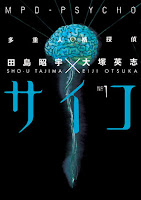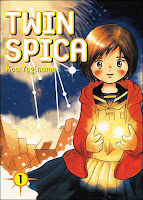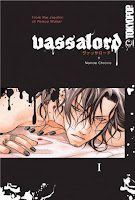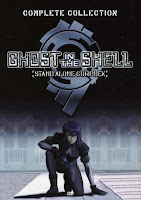My News and Reviews
Experiments in Manga has been going for two months now! So far I’ve been pretty happy with how things have turned out, but I am going to try to start posting more full length manga reviews. Unfortunately, the site search still isn’t working as well as I would like it to and I can’t seem to fix it—very frustrating. Just as a heads up: I’ll be posting the October giveaway next week and this time you’ll only have one week to enter instead of two. You have been warned.
This past week I posted a review for Natsuhiko Kyogoku’s novel Loups-Garous, published under Viz Media’s Haikasoru imprint. It’s an oddly fascinating piece of science fiction mixed with mystery. Library Love, Part 3 gives you a glimpse at some of the manga I’ve been borrowing from my local library—they’ve even thanked me for helping out with their circulation statistics, that’s how much manga I read. And finally, over on Experiments in Reading I reviewed the second book in Jane Lindskold’s Breaking the Wall series, Nine Gates. It’s heavily influenced by Chinese legend and mythology, but most importantly mahjong!
Quick Takes
 Library Wars: Love & War, Volumes 1-2 by Kiiro Yumi. Based on the light novel series by Hiro Arikawa, which I really want to read now but it’s not currently available in English, this is one of two manga adaptations. The armed Library Defense Force has been established to protect books against censorship and defend readers’ rights. As a librarian myself, I really couldn’t pass up on such a great story concept. Iku is passionate about her work, but I really wish she wasn’t quite so scatterbrained. The second volume is better than the first so I’ll definitely be picking up the rest of the series and I hope it continues to improve.
Library Wars: Love & War, Volumes 1-2 by Kiiro Yumi. Based on the light novel series by Hiro Arikawa, which I really want to read now but it’s not currently available in English, this is one of two manga adaptations. The armed Library Defense Force has been established to protect books against censorship and defend readers’ rights. As a librarian myself, I really couldn’t pass up on such a great story concept. Iku is passionate about her work, but I really wish she wasn’t quite so scatterbrained. The second volume is better than the first so I’ll definitely be picking up the rest of the series and I hope it continues to improve.
 MPD-Psycho, Volumes 1-3 written by Eiji Otsuka and illustrated by Shou Tajima. I’ve been reading and enjoying Otsuka’s The Kurosagi Corpse Delivery Service and thought I would give his more controversial MPD-Psycho a try. It’s gory, disturbing, and absolutely fascinating. Tajima’s art fits the story perfectly—it’s stylish and quite often disconcerting. After killing the serial murderer that attacked his girlfriend, Detective Yosuke Kobayashi’s multiple personality disorder is triggered and Kazuhiko Amamiya becomes the dominant personality. His complicated past is slowly revealed and I’m looking forward to reading more of the series to see where things are going to go.
MPD-Psycho, Volumes 1-3 written by Eiji Otsuka and illustrated by Shou Tajima. I’ve been reading and enjoying Otsuka’s The Kurosagi Corpse Delivery Service and thought I would give his more controversial MPD-Psycho a try. It’s gory, disturbing, and absolutely fascinating. Tajima’s art fits the story perfectly—it’s stylish and quite often disconcerting. After killing the serial murderer that attacked his girlfriend, Detective Yosuke Kobayashi’s multiple personality disorder is triggered and Kazuhiko Amamiya becomes the dominant personality. His complicated past is slowly revealed and I’m looking forward to reading more of the series to see where things are going to go.
 Twin Spica, Volume 1 by Kou Yaginuma. This is really a lovely and heartfelt start to a manga series. I’ve heard so many good things about Twin Spica and they are all true. Asumi does seem to me to be too childlike for a fourteen-year-old, but she is a wonderful character and her interactions with other characters, especially her father, are great. I want to cheer her on as she pursues her dream to become an astronaut. While the art is on the cute side, the story is wistful and realistic near-future science fiction. I have a feeling I’ll be following this manga through to the end. Even after only reading the first volume, I highly recommend this series.
Twin Spica, Volume 1 by Kou Yaginuma. This is really a lovely and heartfelt start to a manga series. I’ve heard so many good things about Twin Spica and they are all true. Asumi does seem to me to be too childlike for a fourteen-year-old, but she is a wonderful character and her interactions with other characters, especially her father, are great. I want to cheer her on as she pursues her dream to become an astronaut. While the art is on the cute side, the story is wistful and realistic near-future science fiction. I have a feeling I’ll be following this manga through to the end. Even after only reading the first volume, I highly recommend this series.
 Vassalord, Volumes 1-3 by Nanae Chrono. This series got its start as a pinup illustration. No, really, it did. It’s a strange mish-mash of things that Chrono just felt like throwing together, and in an odd sort of way it works. When I heard that one of the main characters was a gay cyborg vampire who wants to be a priest and who works as a mercenary for the Vatican, I couldn’t pass it up. It’s outrageous, ridiculous, and frequently sacrilegious, but certainly unique. The action and plot are often confused and don’t always make much sense, but Chrono’s artwork provides some great eye-candy—especially with the sexy, sexy vampires Rayflo and Rayfell.
Vassalord, Volumes 1-3 by Nanae Chrono. This series got its start as a pinup illustration. No, really, it did. It’s a strange mish-mash of things that Chrono just felt like throwing together, and in an odd sort of way it works. When I heard that one of the main characters was a gay cyborg vampire who wants to be a priest and who works as a mercenary for the Vatican, I couldn’t pass it up. It’s outrageous, ridiculous, and frequently sacrilegious, but certainly unique. The action and plot are often confused and don’t always make much sense, but Chrono’s artwork provides some great eye-candy—especially with the sexy, sexy vampires Rayflo and Rayfell.
 Ghost in the Shell: Stand Alone Complex, Episodes 1-13. The Ghost in the Shell film was one of the first anime that I ever saw and it made a big impact on me. So, I was excited when a television series came out based on Masamune Shirow’s original manga, but it wasn’t until now that I’ve gotten a chance to sit down and watch the whole thing. Yoko Kanno, one of my absolute favorite composers, is responsible for the soundtrack and it’s fantastic. Stand Alone Complex is divided into two different types of episodes, “Stand Alone” which stand alone and “Complex” which follow the Laughing Man plot line. I find that I really have to pay attention while watching otherwise I miss something important, but it’s good stuff.
Ghost in the Shell: Stand Alone Complex, Episodes 1-13. The Ghost in the Shell film was one of the first anime that I ever saw and it made a big impact on me. So, I was excited when a television series came out based on Masamune Shirow’s original manga, but it wasn’t until now that I’ve gotten a chance to sit down and watch the whole thing. Yoko Kanno, one of my absolute favorite composers, is responsible for the soundtrack and it’s fantastic. Stand Alone Complex is divided into two different types of episodes, “Stand Alone” which stand alone and “Complex” which follow the Laughing Man plot line. I find that I really have to pay attention while watching otherwise I miss something important, but it’s good stuff.
